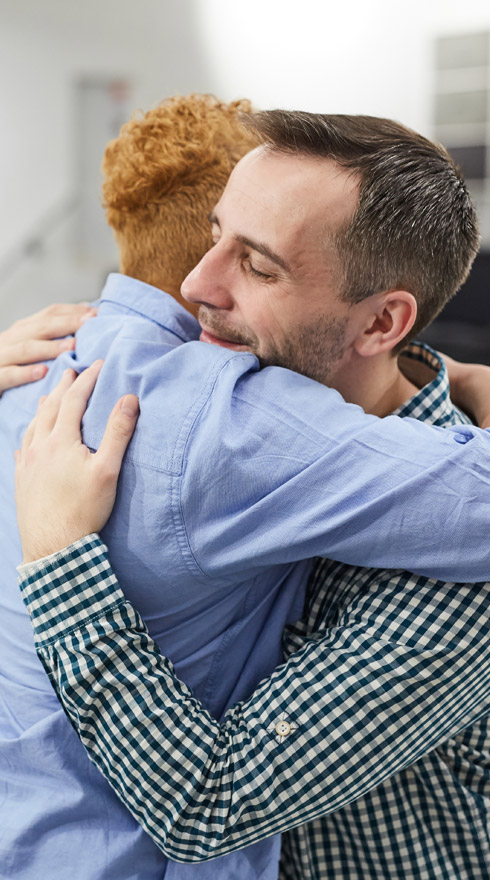Aftercare is an essential part of addiction recovery. Drug and alcohol rehab programs often include an aftercare program to help clients maintain long-term sobriety.
Relapse rates can be as high as 60%, but engaging in aftercare is a great way of reducing this risk and paving the way for a brighter future.
Our extended rehabilitation includes a number of combined therapies and counseling sessions. You can agree upon an extended option once you are near to completing or have already completed your rehab. We also have an alumni network of supportive members who have also successfully completed our addiction rehabilitation program.

What Is a Rehab Aftercare Program?
Rehab aftercare programs support clients once they leave inpatient treatment. Aftercare programs include resources and activities that help you cope with triggers, stresses, and cravings you may encounter when your treatment finishes.
There are several types of aftercare plans that can be incorporated into your recovery process, including:
- Sober living homes
- Support groups
- Outpatient treatment
- Alumni programs
- Ongoing therapy
- Case management
At United Recovery CA, each client receives an individualized aftercare plan tailored to their specific needs and goals. Aftercare can include anything from finding sober housing to finding a job to locating various support groups that can keep you on track for long-term recovery.
Aftercare programs should last for as long as you need. Some people require several months of aftercare, and others need more than a year. There is no timeline when getting the help you need on your road to recovery – it’s a personal preference that you’ll be able to discuss with your counselor.
The Benefits of Attending Rehab Aftercare Programs

There are many benefits of maintaining an aftercare program after your initial treatment ends. These include:
- Lowering the chance of relapse – Studies have shown that engaging with an aftercare program can improve your chances of staying in long-term recovery.
- Holding yourself accountable – knowing that you’re answerable to other people can help you avoid self-destructive coping strategies.
- Maintaining connection – staying connected with a community of professionals and peers on the same journey as you is vital. If you feel that you are about to relapse, you have a network to call on for support.
- Continuing healing – substance use disorder can damage both your mind and your body. Inpatient treatment facilities can begin your healing process, but aftercare programs can help to maintain and support your recovery journey.
- Starting sobriety the right way – recovery is a complex process, and aftercare can help you to continue your sobriety with resources and a strong support system after you leave inpatient treatment.
Relapse Prevention & Aftercare Programs With Us
At United Recovery CA, we know that recovery is different for everyone, which is why we offer a comprehensive aftercare program tailored to each client. Our case managers help you identify the resources that you need to maintain abstinence and will work with you to create a plan for a healthy, sober life. If you are struggling with staying sober in your aftercare program, reach out to our team at United Recovery CA. Our highly trained specialists have many years of experience in helping people remain sober and will work with you to find a treatment plan that works.
Alumni
Our alumni programs provide additional support for those who have received treatment with us at United Recovery CA. Feeling part of a community is vital for recovery, so we offer continuing guidance and sober events to allow you to build up a network of sober relationships so you don’t ever need to feel alone in your journey.
Learn more about our Alumni program
12-Step Groups
12-step support groups bring together others in a similar situation to you. They provide a safe space to share experiences and coping strategies and make up a key part of treatment here at United Recovery CA. 12-step groups focus on altruism and spiritual and personal development and are a well-established form of mutual-aid group. After your treatment with us ends, we will also support you in finding local chapter meetings that will enable you to continue working towards recovery. 12-step is often part of both rehab and extended rehab services.
Information about our extended rehabs
Other Fellowships
There are many other fellowships that people can take advantage of in recovery, including Cocaine Anonymous, Heroin Anonymous, and Celebrate Recovery. They also follow the 12-step model, which has proven very beneficial in helping those in recovery. Many other support groups do not follow the 12-step model, such as SMART Recovery. Ultimately, the support group you choose comes down to personal preference.
Our options for support groups
Other services that we include with our alumni program are:
- A twenty-four-hour crisis hotline
- Crisis intervention services
- Volunteering opportunities
- Continuing education programs
Our goal is to support you in your recovery even after your time with us ends.
Alcoholics Anonymous (AA)
Founded in 1935, Alcoholics Anonymous is perhaps the best-known 12-step group in the world. The group uses spiritual principles to guide members through the 12-steps to recovery, and members have sponsors to guide them throughout the process. Participation is anonymous, and there are groups in the majority of towns and cities across the country.
Although Alcoholics Anonymous uses spirituality to guide recovery, you do not have to be religious to join. Membership is free, and meetings are an excellent way to meet others on a similar path to you.
Narcotics Anonymous (NA)
Narcotics Anonymous follows the same principles and structure as Alcoholics Anonymous but is for those with narcotic substance use disorders. The only requirement to join is a desire to stop using narcotic substances, and membership is free and anonymous. Anonymity is highly prized within Narcotics Anonymous, as it encourages members to place their principles before their personalities.
As in Alcoholics Anonymous, those in Narcotics Anonymous will select a sponsor to support them through the 12-steps. Their sponsors will hold them accountable and provide encouragement throughout recovery.
Do You Need Help?
We offer initial assessment and advice via phone or contact form.
Counseling & Therapy
Counseling and therapy don’t just help in rehab – they can form a part of your long-term recovery plan. Therapy is a critical part of inpatient treatment, with sessions sometimes being held multiple times a day. It is advised to continue with scheduled therapy sessions after treatment to help maintain sobriety and continue emotional healing.
Counseling and therapy sessions can be integrated into your aftercare program as little or as much as you need. Intensive outpatient treatment can include attending sessions almost every day, whereas other options may only include a few sessions.
Therapies used in addiction recovery include behavioral therapies such as cognitive-behavioral therapy (CBT) and group therapy. CBT helps clients examine their thoughts and attitudes and replace harmful behaviors with healthy ones, making it a highly effective treatment for those recovering from addiction. CBT is included in each personalized plan here at United Recovery CA. Our experienced therapists focus on utilizing CBT to combat the fears of each client via role-play and aim to relax the mind and body in stressful situations. This helps to provide each client with tools they will be able to use once they leave our facility.
At United Recovery CA, we provide continuing access to counseling and therapy as part of our aftercare program. We believe that prioritizing mental health is vitally important in recovery and consistent access to support will lower the chances of relapse.








